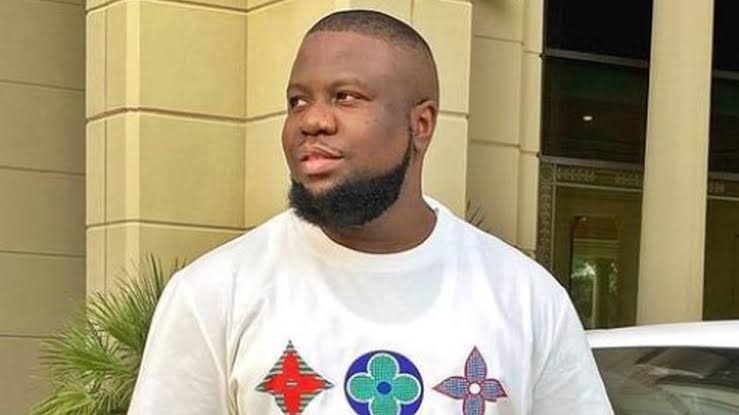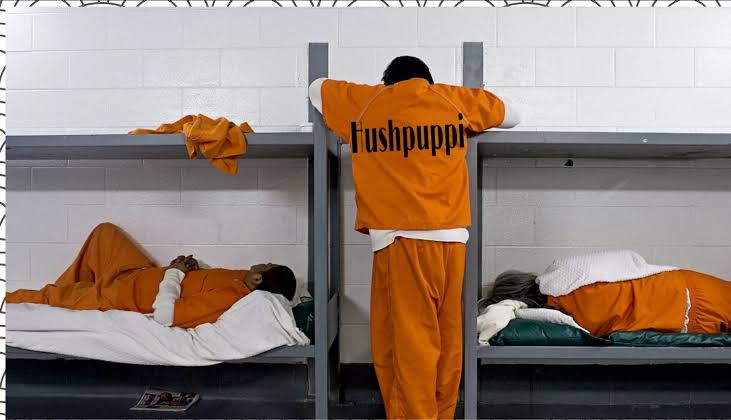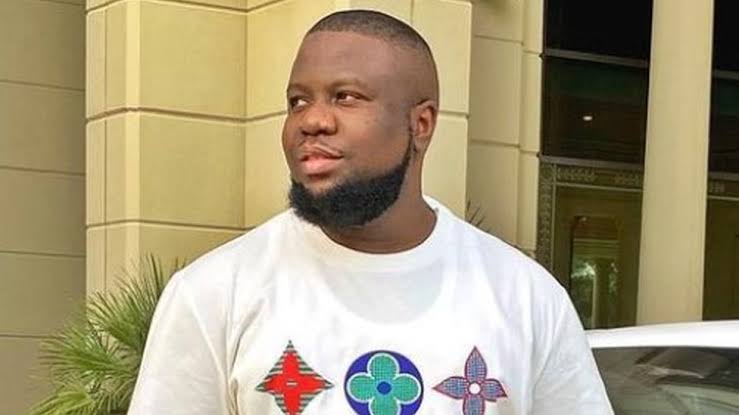Long before the courtroom verdict was sealed, Ramon Abbas—better known to the world as Hushpuppi—had already become a ghost of two lives. One was lived in the glow of Instagram, where luxury cars, designer clothes, and penthouse views created the illusion of untouchable success.
- The Rise: From Lagos to Instagram Fame
- The Fall: Arrest, Extradition, and Legal Battles
- First Days Inside FCI Fort Dix
- Work Assignments: From Billionaire to Bathroom Cleaner
- Education and Skill-Building Programs
- Recreation, Exercise, and Mental Health
- Prison Social Life and Microeconomy
- Correspondence with the Outside World
- Future Beyond Bars
- The Price of Misbegotten Luxury
The other now unfolds behind concrete walls in America, where those same hands that once signed deals and held champagne glasses now move trays in a crowded cafeteria.
The journey from Lagos internet cafés to Dubai penthouses and finally into the U.S. federal system is a story already told in headlines. What remains hidden, however, is the daily rhythm of his existence: the stripped-down routines, the silent adjustments, and the quiet battles that play out when notoriety collides with confinement.
Inside prison, reputation carries weight, but it does not guarantee comfort. For Abbas, every day is a negotiation—not with the wealth he once flaunted, but with the reality of life in uniform, where even the smallest privileges must be earned.
To grasp his struggle is not simply to revisit the crimes that brought him here, but to explore how a man who once embodied excess now navigates scarcity.
The Rise: From Lagos to Instagram Fame

Ramon Olorunwa Abbas, better known as Hushpuppi, was not born into the world of designer brands and private jets. He grew up in the crowded streets of Lagos, where survival often meant improvisation. Lagos itself was a city of contradictions—chaotic traffic jams against the backdrop of luxury high-rises, endless opportunities shadowed by suffocating poverty. For a young man with big ambitions but little means, Lagos was both a cage and a springboard.
Hushpuppi found his escape through image. Long before his name became synonymous with one of the biggest cybercrime cases in U.S. history, he began curating a digital persona on Instagram. His feed was not just pictures; it was performance art. Every photo of champagne bottles, every Gucci outfit, and every private jet selfie was carefully staged to project a life of limitless wealth. Millions followed him, not just for the fashion, but for the fantasy he represented—a Lagos boy who had somehow hacked his way into the global elite.
This rise to Instagram fame was meteoric. By 2020, Hushpuppi had over 2.5 million followers, most of them young Nigerians and Africans in the diaspora who saw in him a symbol of possibility. But behind the filters and expensive watches was a darker truth—his fame was not sustained by music, acting, or entrepreneurship, but by the invisible trails of wire fraud and identity theft.
The Lagos streets had taught him how to survive, but Instagram had given him a global stage. And for years, it looked like he was untouchable.
The Fall: Arrest, Extradition, and Legal Battles
The very city that amplified his power would become the site of his undoing. In June 2020, Abbas was arrested in Dubai, in an operation coordinated by the FBI and UAE authorities. Agents had been monitoring him for months, mapping his transactions, communications, and network of associates.

The arrest itself was swift but dramatic—a man accustomed to control, suddenly powerless, escorted through airport corridors toward extradition.
Extradition to the United States was both a logistical and psychological blow. Abbas, who had once dictated the terms of his public life, now faced confinement under a foreign legal system. Upon arrival, he underwent the standard intake process: fingerprinting, medical evaluation, and orientation to the federal prison system. This initial phase was disorienting, a stark departure from the curated predictability of Dubai’s luxury scene.
In court, Abbas faced charges that carried serious penalties. He pleaded guilty to conspiracy to engage in money laundering, acknowledging his role in orchestrating schemes that moved tens of millions of dollars across international borders. The sentence—11 years in FCI Fort Dix, a federal prison, —was a jarring punctuation mark on a narrative that had, until recently, seemed untouchable.
Public reaction was intense. On Instagram, followers oscillated between disbelief, fascination, and schadenfreude. International media dissected his lifestyle, tracing the trajectory from viral Instagram posts to court transcripts. In Nigeria, the story sparked national debate: was Hushpuppi a symbol of ambition gone awry, or a cautionary tale of moral failure?
Beyond the headlines, the personal impact was profound. The arrest and extradition stripped Abbas of agency, forcing him into a reality where every movement, conversation, and decision was regulated. The shock of transition—luxury to prison—introduced both psychological and emotional challenges that would define his experience in the coming years.
First Days Inside FCI Fort Dix
When Ramon Abbas, better known as Hushpuppi, entered the gates of the Federal Correctional Institution (FCI) Fort Dix in New Jersey, he stepped into a world far removed from the luxury penthouses of Dubai. Fort Dix, one of the largest federal prisons in America, is a low-security facility that houses thousands of inmates.
According to Bureau of Prisons records, it is a place where the routine is rigid, the days are long, and personal identity quickly dissolves into uniform numbers and scheduled counts.

The first days are often the hardest for new inmates. Orientation introduces them to a tightly regulated environment—wake-up bells at dawn, roll calls, cafeteria lines, and strict curfews. Inmates arriving from high-profile cases, like Abbas, attract immediate attention, but the system is designed to neutralize celebrity status. Every prisoner, regardless of their past, is subject to the same rules.
For Hushpuppi, the shock was not just about confinement but about the stripping away of autonomy. Court filings and prison guidelines show how new arrivals are assigned dormitory-style housing, issued standard khaki uniforms, and given schedules that leave little room for personal choice. Meals follow a cycle of simple portions—far from the fine dining that once filled his Instagram page. Privacy, too, is scarce; living quarters are shared, and supervision is constant.
The adjustment process in these early days is as much psychological as it is physical. Inmates must learn to navigate a new hierarchy, where respect is earned not by wealth but by conduct. For Abbas, whose name had become synonymous with extravagance, those first days marked the beginning of a stark transformation—from global internet sensation to just another inmate adapting to the unbending discipline of Fort Dix.
Work Assignments: From Billionaire to Bathroom Cleaner
For Hushpuppi, work in prison is both a necessity and a lesson in humility. The sprawling halls of FCI Fort Dix are organized around routines, and every inmate is assigned a role. In Abbas’s case, he reportedly took on the task of cleaning bathrooms—a sharp contrast to the private jets and designer wardrobes of his previous life.
Picture it: early morning, fluorescent lights flickering above, the faint smell of disinfectant hanging in the air, and the echo of metal boots on concrete floors. Abbas dons gloves and apron, carrying buckets and cleaning tools down narrow corridors. The task is monotonous, repetitive, and physically demanding, but it requires attention to detail. Miss a spot, and the work is redone; shortcuts are noticed and criticized by both staff and fellow inmates.

Yet, within this routine, there is an unexpected structure. Cleaning bathrooms, organizing supplies, and maintaining order create small victories—measurable, immediate feedback that contrasts with the abstract, volatile world of Instagram fame. For Abbas, these moments will offer both frustration and grounding, a reminder that influence now is earned through action rather than followers or wealth.
Social dynamics within work assignments are crucial. Respect is negotiated through reliability, effort, and awareness of prison hierarchies. Abbas, once used to commanding attention through charm and opulence, now navigates a system where trust and discretion matter more than style. Observers note that he has been cautious, friendly but reserved, avoiding unnecessary conflicts while demonstrating competence in his tasks.
This work is not just physical; it is psychological. The monotony, repetition, and humility required push Abbas to confront the stark contrast between his former life and his current reality. Every scrubbed sink or sanitized floor becomes a metaphor: no matter how high one climbs, accountability and discipline are inescapable, and shortcuts carry consequences.
Education and Skill-Building Programs
FCI Fort Dix, like other federal facilities, emphasizes rehabilitation through education. Inmates have access to a range of programs, from basic literacy and GED preparation to vocational training in trades such as plumbing, electrical work, or culinary skills. Hushpuppi has reportedly engaged with these programs, understanding that skill-building is both a way to occupy time and a critical tool for life beyond prison.

Classes are held in small, monitored rooms, with instructors guiding inmates through structured lessons. For Abbas, who thrived on information and strategy in his previous operations, these sessions provide mental engagement, a way to exercise intellect in a controlled setting. Topics range from business basics to digital literacy—areas that, ironically, echo his past skills but redirect them toward legitimate pathways.
Participation in these programs is voluntary but carries subtle incentives. Inmates who engage consistently may earn privileges such as increased recreation time, access to more resources, or better consideration for work assignments. For Abbas, this becomes a quiet competition—not for followers, but for mastery, discipline, and small markers of achievement.
Education also offers introspective opportunities. Courses in personal development and ethics encourage reflection on past choices. Abbas, navigating the tension between past audacity and present limitations, reportedly spends time considering the consequences of his actions and how knowledge can shape future decisions. This is a different kind of power—quiet, cumulative, and potentially transformative.
Rehabilitation programs serve another critical role: connection. They foster dialogue among inmates from varied backgrounds, creating a space where social skills are exercised in ways not dependent on wealth or notoriety. For Abbas, these interactions provide insights into lives far removed from Instagram glamour, highlighting common struggles, regrets, and aspirations.
Recreation, Exercise, and Mental Health
Inmates at FCI Fort Dix are allowed limited recreation, typically in designated outdoor yards or indoor exercise areas. For Hushpuppi, these moments offer a rare escape from the confines of his cell and the monotony of structured routines. Imagine stepping onto the yard: the cold wind biting at exposed skin, the distant chatter of fellow inmates, the sound of basketballs echoing off concrete walls. These simple sensory experiences—fresh air, physical exertion, sunlight—become small yet significant reprieves from the claustrophobic environment.
Exercise routines vary: some jog laps around the yard, others lift weights or engage in casual sports. For Abbas, movement serves a dual purpose: physical well-being and psychological relief. The rigorous discipline of exercise allows him to channel frustration, stress, and lingering anxiety into controlled, productive energy.
Mental health, however, is a constant struggle. The transition from wealth and adulation to prison anonymity is a profound psychological shock. Hushpuppi reportedly contends with periods of isolation, guilt, and introspection, compounded by the public scrutiny of his past. In a space where every action is monitored, and privacy is limited, cultivating mental resilience is both necessary and challenging.
To cope, Abbas reportedly engages in spiritual practice and quiet reflection. Prayer, meditation, and reading become anchors in a life otherwise defined by restriction. These activities provide structure, calm, and a sense of agency, offering a pathway to emotional equilibrium amidst the rigid schedules and unpredictability of prison life.
Recreational time, brief as it is, also fosters social connection. Casual interactions during exercise or shared leisure activities allow inmates to navigate social hierarchies, test alliances, and build rapport. For Abbas, these moments offer subtle insights into human behavior—lessons that his former digital empire could never have taught him firsthand.
Prison Social Life and Microeconomy
Life in prison is a microcosm of society, complete with hierarchies, informal economies, and intricate social dynamics. Within FCI Fort Dix, status is determined not by money, fame, or followers, but by respect, reliability, and social awareness. For Hushpuppi, once celebrated on Instagram for his audacity and wealth, this represents a radical shift. Influence is earned through personal conduct, work ethic, and the ability to navigate relationships carefully.
A subtle economy exists among inmates. Items like commissary goods, personal favors, and skills can be traded. In this context, Hushpuppi’s previous skills—networking, strategic thinking, and charisma—become unexpectedly useful. While no longer wielding financial leverage, he applies his social acumen to understand alliances, identify threats, and maintain cordial relations.
Interactions are delicate. Trust is precious and often conditional; conflicts can escalate quickly. Abbas reportedly maintains a reserved demeanor, engaging selectively and avoiding unnecessary confrontations. His reputation as a thoughtful, reliable participant in shared tasks helps establish credibility, though he remains cautious about revealing personal history.
This social microcosm reinforces a broader truth: life in prison is governed by rules of behavior distinct from the outside world. Patience, humility, and strategic observation are more valuable than wealth or charisma. Hushpuppi’s immersion in this environment highlights the stark contrast between the social validation of Instagram fame and the earned respect within confined, high-stakes communities.
The prison microeconomy, social hierarchy, and group dynamics all contribute to Abbas’s daily reality, forcing him to reconcile former identity with present circumstance. In doing so, he learns lessons about adaptability, interpersonal strategy, and the intangible value of trust—lessons that are likely to outlast the physical confines of Fort Dix.
Correspondence with the Outside World
Despite the constraints of prison life, Abbas maintains limited contact with the world beyond Fort Dix. Federal prisons allow regulated phone calls, monitored emails, and correspondence via letters. For Hushpuppi, these interactions are both a lifeline and a reminder of the life he left behind.

Family members and select associates provide updates from the outside, bridging the gap between confinement and the broader world. These communications are carefully managed; privacy is limited, and each conversation is recorded or monitored for security reasons. Even so, the ability to connect with loved ones offers psychological relief and a sense of continuity.
Managing public perception is another subtle concern. While removed from social media platforms, the global narrative about Abbas continues to evolve. Reports of his imprisonment, lifestyle, and sentencing circulate widely, generating curiosity and commentary. He must navigate the delicate balance of staying informed without being consumed by the attention that once defined him.
Letters and calls serve a dual purpose: they maintain relationships and reinforce reflection. Abbas reportedly uses these moments to discuss personal development, seek advice, and process his experiences. The correspondence acts as a mirror, reflecting both accountability and aspiration. Even in isolation, he negotiates identity, consequence, and connection—threads that shape the larger narrative of life inside prison.
Future Beyond Bars
The world outside FCI Fort Dix will be drastically different for Hushpuppi. Reintegration poses challenges both practical and social: stigma, legal restrictions, and the need to rebuild reputation and credibility. Yet, there is potential. The skills he reportedly honed—strategic thinking, social intelligence, digital literacy—can be redirected toward entrepreneurship, mentorship, or advocacy.
Financial rebuilding will require a disciplined approach, but the experiences inside prison provide a foundation often unavailable in free society: patience, accountability, and the ability to navigate complex human systems without reliance on wealth or fame. For Abbas, the lessons of Fort Dix could shape a second life, one defined less by extravagance and more by calculated, sustainable influence.
His story also offers broader societal lessons. In Nigeria and beyond, the saga of Hushpuppi highlights the seduction of online wealth, the consequences of fraud, and the resilience required to navigate failure. For youth drawn to the glitter of social media and the promise of instant riches, Abbas’s journey is cautionary yet instructive: choices have consequences, and transformation—while difficult—is possible.
The Price of Misbegotten Luxury
From Instagram fame to federal incarceration, Hushpuppi’s life has been a dramatic pendulum swing between extremes. The narrative is not simply one of criminality and punishment; it is a story of psychological reckoning, social adaptation, and the slow recalibration of identity.

Luxury, power, and adoration offered transient thrills, but they could not substitute for accountability, resilience, and moral grounding. Within the walls of Fort Dix, Abbas confronts the consequences of his actions daily—physically, socially, and psychologically.
Yet, there is hope. Through reflection, structured routine, education, and human connection, the possibility of growth and redemption exists. His journey offers a vivid, cautionary lens on the intersection of fame, fraud, and the human capacity for change, leaving many to ponder the fragile line between illusion and reality, between power and humility, and between freedom and confinement.













